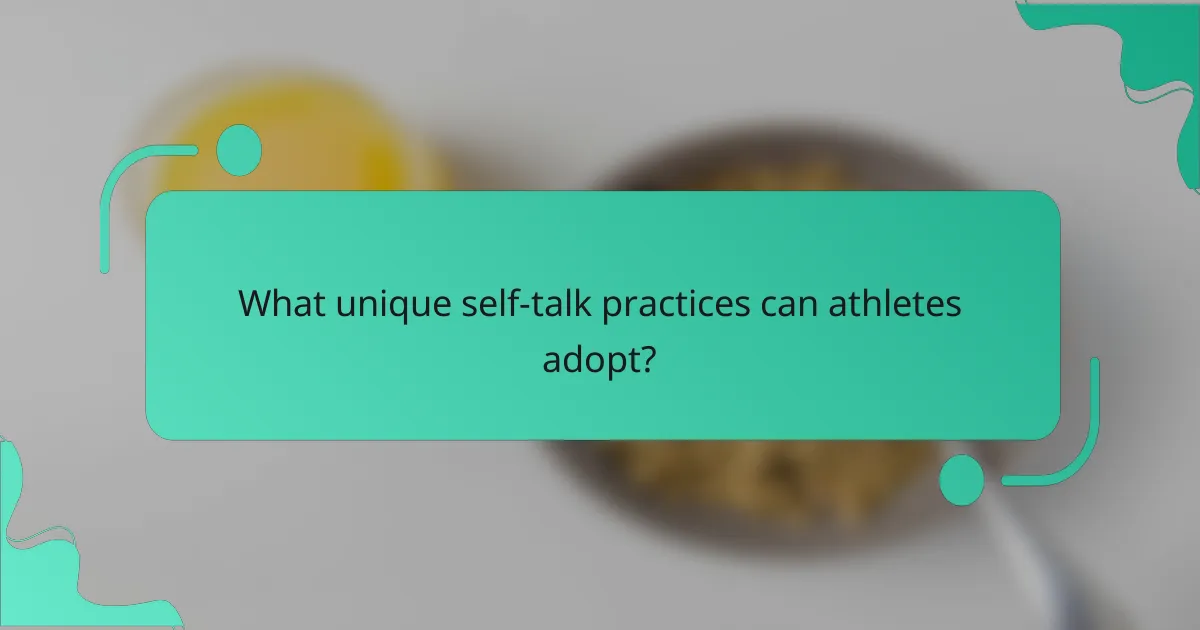Building confidence is crucial for athletes aiming to enhance their performance. Positive self-talk practices like affirmations and visualization can foster a supportive mindset. Techniques such as reframing negative thoughts promote resilience. Regularly integrating these strategies can lead to improved focus and self-assurance in competitive settings.

What are Positive Self-Talk Practices for Building Confidence in Athletes?
Positive self-talk practices enhance athletes’ confidence by fostering a positive mindset. Techniques include affirmations, visualization, and reframing negative thoughts. Affirmations reinforce self-belief, while visualization helps athletes mentally prepare for success. Reframing negative thoughts into constructive feedback promotes resilience. Regular practice of these techniques can lead to improved performance and greater self-assurance in competitive situations.
How does positive self-talk influence athletic performance?
Positive self-talk significantly enhances athletic performance by boosting confidence and focus. Athletes who engage in positive self-talk experience increased motivation and reduced anxiety, leading to improved outcomes. Research indicates that self-affirmations can enhance resilience during challenging moments in competition. Additionally, positive self-talk can help athletes visualize success, further reinforcing their belief in their abilities.
What are the psychological benefits of positive self-talk for athletes?
Positive self-talk enhances athletes’ confidence by promoting a positive mindset and reducing anxiety. It helps athletes focus on their strengths, improving performance under pressure. Research indicates that athletes who engage in positive self-talk experience increased motivation and resilience. This practice cultivates a unique attribute of mental toughness, essential for overcoming challenges in competitive environments.

What are the universal attributes of effective self-talk?
Effective self-talk universally enhances confidence, focus, and resilience in athletes. Key attributes include positivity, specificity, and motivational language. Positive self-talk fosters a supportive inner dialogue, while specificity ensures clarity in goals. Motivational language inspires action and determination, creating a powerful mental framework for performance.
What types of positive affirmations are most effective?
Positive affirmations that focus on specific achievements and personal strengths are most effective for athletes. These affirmations enhance confidence and reinforce a positive mindset. Examples include “I am strong and capable” and “I perform at my best under pressure.” Tailoring affirmations to individual goals increases their impact.
How can visualization techniques enhance self-talk?
Visualization techniques can significantly enhance self-talk by creating vivid mental images that reinforce positive affirmations. These techniques help athletes visualize success, which strengthens their belief in their abilities. For instance, picturing a successful performance can lead to increased motivation and focus. Research indicates that mental imagery improves confidence and reduces anxiety, making it a powerful tool in sports psychology. By incorporating visualization into self-talk practices, athletes can cultivate a more resilient mindset, ultimately enhancing their performance.

What unique self-talk practices can athletes adopt?
Athletes can adopt unique self-talk practices such as visualization, affirmations, and mindfulness to enhance confidence. Visualization involves mentally rehearsing successful performances, which can strengthen belief in abilities. Affirmations, or positive statements, help reinforce a positive self-image. Mindfulness practices encourage athletes to focus on the present moment, reducing anxiety and improving concentration. These techniques foster a resilient mindset essential for peak performance.
How does self-talk vary among different sports?
Self-talk varies significantly among different sports, reflecting the unique demands and environments of each discipline. Athletes in individual sports, like tennis, often employ focused positive self-talk to enhance concentration and manage pressure. In contrast, team sports, such as football, may emphasize collective affirmations to foster camaraderie and shared motivation.
Research indicates that athletes who practice sport-specific positive self-talk can improve performance metrics, such as reaction time and decision-making. For example, swimmers might use motivational phrases to maintain rhythm, while basketball players may focus on confidence-boosting statements before free throws.
Additionally, the context of competition influences self-talk. High-pressure situations often lead athletes to adopt more intense, positive affirmations to combat anxiety, whereas routine practices might involve casual, reinforcing dialogue. This adaptive self-talk strategy is crucial for building resilience and confidence across various sporting environments.
What role does team culture play in self-talk strategies?
Team culture significantly enhances the effectiveness of self-talk strategies in athletes. A supportive environment fosters positive self-talk, which builds confidence and resilience. When athletes share a strong team culture, they are more likely to engage in constructive self-dialogue, reinforcing their belief in personal and collective abilities. This synergy between team dynamics and self-talk can lead to improved performance outcomes and a more cohesive team spirit.

What are the rare attributes of self-talk that can impact confidence?
Rare attributes of self-talk that can impact confidence include the ability to reframe negative thoughts, the use of personalized affirmations, and the incorporation of visualization techniques. These practices enhance self-efficacy, leading to improved performance. Additionally, unique phrases tailored to individual experiences can foster a deeper connection to one’s goals. Engaging in reflective self-talk can also reveal insights about personal strengths and weaknesses, further boosting confidence.
How can athletes personalize their self-talk for specific challenges?
Athletes can personalize their self-talk by tailoring affirmations to specific challenges. This involves identifying the nature of the challenge and crafting positive statements that address it directly. For instance, an athlete facing anxiety before a competition may use phrases like “I am prepared and capable.”
To enhance effectiveness, self-talk should align with the athlete’s unique attributes, such as their strengths and past successes. Incorporating visualization techniques can also amplify the impact of self-talk, allowing athletes to mentally rehearse their performance while using affirmations.
Regular practice of personalized self-talk can build resilience and foster a growth mindset, essential for overcoming obstacles in sports. Athletes should continually refine their self-talk strategies based on their experiences and evolving challenges.
What uncommon phrases have proven effective in high-pressure situations?
Uncommon phrases like “I’ve prepared for this” and “I thrive under pressure” can enhance confidence in athletes during high-pressure situations. These phrases reinforce a positive mindset, shifting focus from anxiety to capability. Encouraging self-affirmation through unique statements can build resilience and improve performance.

How can athletes integrate self-talk into their training routines?
Athletes can effectively integrate self-talk into their training by using positive affirmations and visualization techniques. Consistent practice of self-talk enhances confidence and focus during performance.
Firstly, athletes should identify specific affirmations that resonate with their goals, such as “I am strong” or “I can succeed.” Repeating these phrases during training sessions reinforces a positive mindset.
Secondly, incorporating visualization techniques is crucial. Athletes can visualize successful performances while using their affirmations to create a mental image of achievement.
Lastly, maintaining a self-talk journal can be beneficial. Recording thoughts and progress helps track improvements and reinforces positive self-talk habits.
What are the best practices for implementing self-talk during competitions?
Positive self-talk enhances athlete confidence during competitions by fostering a supportive mental environment. To effectively implement self-talk, athletes should practice specific phrases that reinforce their skills, visualize successful outcomes, and maintain focus on their goals.
1. Use affirmations: Create short, powerful statements like “I am strong” or “I can do this” to boost self-belief.
2. Visualize success: Mentally rehearse winning scenarios to build confidence and reduce anxiety.
3. Focus on the process: Concentrate on individual performance elements rather than outcomes to maintain composure.
4. Create a mantra: Develop a personalized phrase to repeat during competition for motivation and focus.
These practices can significantly impact performance by promoting a positive mindset and resilience.
How can coaches support athletes in developing positive self-talk?
Coaches can support athletes in developing positive self-talk by modeling constructive dialogue and providing targeted feedback. Encouraging athletes to replace negative thoughts with affirmations enhances their confidence. Regular workshops on self-talk techniques can also create a supportive environment. Utilizing visualization exercises helps athletes practice positive self-talk in real scenarios, reinforcing their mental resilience.

What common mistakes should athletes avoid with self-talk?
Athletes should avoid negative self-talk, unrealistic expectations, and comparisons to others. These mistakes can undermine confidence and performance. Instead, they should focus on constructive affirmations and realistic goals. Emphasizing personal progress fosters a positive mindset.
How can negative self-talk be reframed into positive affirmations?
Negative self-talk can be reframed into positive affirmations by identifying the negative thoughts and replacing them with constructive statements. This practice enhances an athlete’s confidence and resilience.
Start by recognizing specific negative phrases, such as “I can’t do this.” Replace them with affirmations like “I am capable and prepared.” This shift fosters a growth mindset.
Regularly practice these affirmations, ideally daily, to reinforce positive self-talk. Athletes can benefit from writing affirmations down or repeating them aloud before competitions.
Incorporating visualization techniques alongside affirmations can further enhance confidence. Athletes should visualize successful performances while affirming their abilities, creating a powerful mental framework for success.

What actionable tips can athletes use to enhance their self-talk?
Athletes can enhance their self-talk by practicing specific techniques that boost confidence. Techniques include using positive affirmations, visualizing success, focusing on strengths, and reframing negative thoughts. For example, repeating phrases like “I am capable” reinforces a positive mindset. Visualization helps athletes mentally prepare for performance, while focusing on strengths shifts attention from doubts. Reframing negative thoughts into constructive feedback promotes resilience and growth. These actionable tips cultivate a supportive internal dialogue essential for athletic success.
What strategies can athletes use to maintain positive self-talk consistently?
Athletes can maintain positive self-talk consistently by developing structured routines and strategies. Regularly practicing affirmations boosts confidence and reinforces a positive mindset. Visualization techniques enable athletes to mentally rehearse success, creating a positive self-image. Journaling thoughts and experiences helps identify patterns in self-talk, allowing for adjustments. Engaging in mindfulness practices fosters awareness of negative thoughts, promoting immediate redirection to positive affirmations. Lastly, surrounding oneself with supportive teammates enhances a positive environment, further encouraging constructive self-talk.
